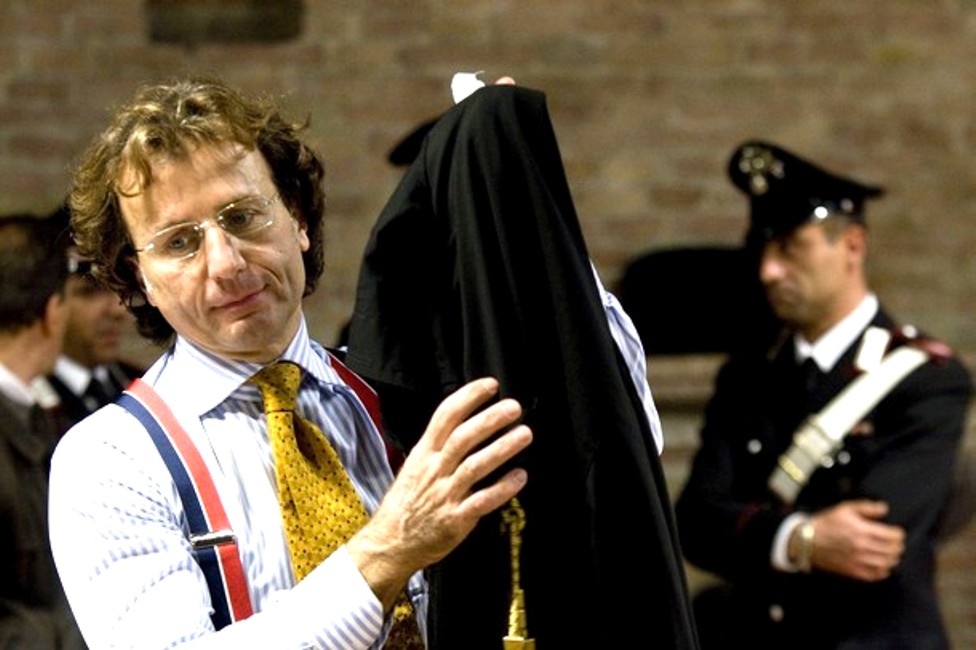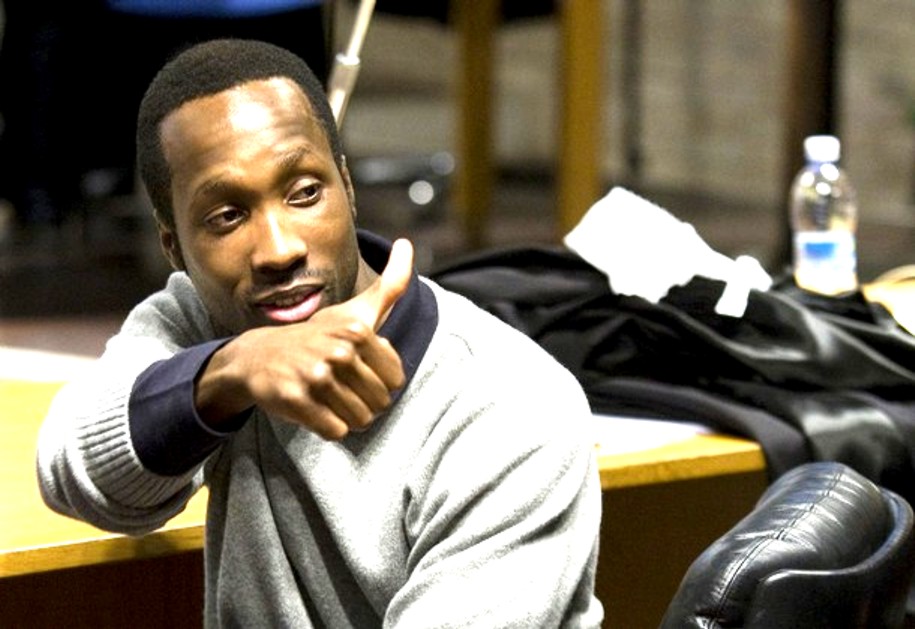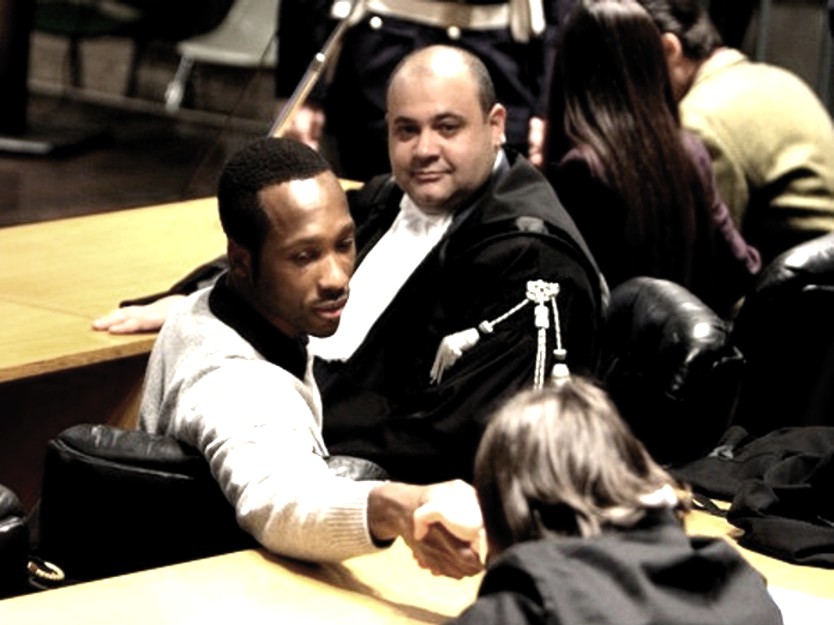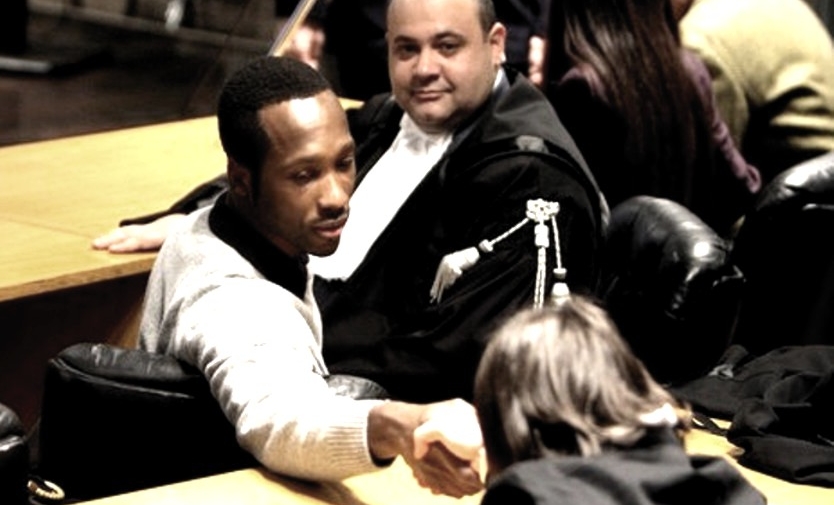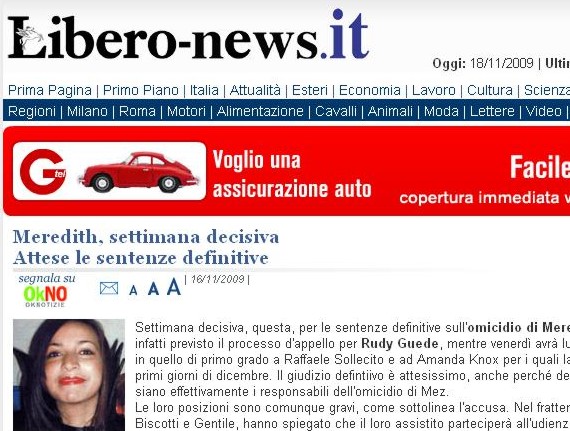
Thursday, Knox lawyers will argue to First ("Murders") Chamber of Supreme Court that Florence court's Calunnia II conviction of Knox was wrong. Uphill battle. Florence reasoning has been widely praised.
Wednesday, November 18, 2009
Rudy Guede Appeal: Lawyer For Meredith’s Family Mr Maresca In Court Today DRAFT
Posted by Peter Quennell
Italian reports are still conflicting and there are none out yet in English.
But it appears that the court has rejected the request of the Guede appeal team to reopen several components of the investigation, to bring in new witnesses, and to hear testimony on stress psychology and on the towel found beside Meredith.
This does not bode well for his appeal prospects.
Judge Micheli summarised a lot of evidence proving that Guede was throughout a part of the vicious assault on Meredith. He handed Guede a rape conviction as well as a murder conviction and Guede is serving his 30 years in the sex offenders’ wing of Viterbo Prison north of Rome..
Probably the best Guede could have done would have been to come clean, relate the full story, and claim that he was unaware from the other assailants of where events were headed.
But that he did not call an ambulance may have sealed Meredith’s fate forever.
Added from Paolo Santalucia of the Associated Press
Later Wednesday, prosecutor Pietro Catalani asked the court to confirm the sentence of 30 years in jail for Guede.
“He is not credible,” Catalani said, adding that wounds on Kercher’s body suggest it took far longer for her to die than Guede’s testimony indicated.
Proceedings were adjourned to Dec. 21, when Guede’s defense lawyers will argue their case.
Rudy Guede Appeal: Yes Guede Testimony Does Sound Far From The Full Truth
Posted by Tiziano
1) La Stampa runs essentially the same story as Nicki translated and posted jut below, but with this addition.
In court this morning there was also the psychiatrist Alessandro Meluzzi, who together with the criminologist Vincenzo Mastronardi, provided expert testimony for the defence on the behaviour of the accused after the crime.
Guede fled and was arrested in Germany. This was behaviour of “flight and avoidance”, according to Meluzzi, linked to “traumatic stress syndrome” which struck him after the crime.
2) Corriere della Sera also has essentially the same story but with these additions.
The defence of the young man intends to ask for the partial reopening of the trial debate to hear new witnesses and to hear from others already heard by the prosecution, but who - according to the lawyers - could give a different version from the initial one.
The lawyers also are putting their hopes on the possibility of a new expert report on the towels found next to the English student’s lifeless body, which Guede claims to have used in an effort to help Meredith, staunching the wound to her neck.
The aim of the defence is to show that it was not Rudy to kill Meredith that evening, because as the young man has always claimed, he was at the house at Via della Pergola on the night between November 1st and 2nd, 2007, but when the crime happened he was in the bathroom.
Once he came out, he clashed with Mez’ assassin for a moment. He tried to help the girl but then, overcome with fear, he took flight.
To specifically evaluate this thesis, the defence of the Ivorian has had an expert report done by the criminologist Vincenzo Mastronardi and the psychiatrist Alessandro Merluzzi, who were both in court.
Speaking to journalists before the hearing began, Merluzzi explained how Rudy, after the facts, was overcome by “post traumatic stress syndrome” in which a ” gentle, weak but mild personality like Rudy’s was able to put into action the flight behaviour, which certainly did nothing for his credibility but which we believe is completely understandable and explained from the psychological point of view, clinical psychology and psycho-dynamics.”
Merluzzi explained, “We believe that our evaluation will give the judges an element of evaluation which is new and different not only in the facts which have emerged from the supporting proceedings, but also on the reasons and motivations which incited Rudy.”
Rudy Guede Appeal: His Story In His Own Words - Not Sounding Like The Much-Wanted Full Truth
Posted by Jools
Translated from the Italian in Il Messaggero:
The process of second-degree [appeal] for Rudy Guede, already sentenced to 30 years imprisonment for the complicity in the murder of Meredith Kercher, commences.
The Court of Appeal of Perugia has decided to have the hearing in public court, admitting the request by the defendant. Guede has asked that the appeal process be conducted in open court “so that all may know the truth.” In attendance reporters were allowed but not photographers or TV cameras.
“I want to say to the Kercher family that I did not kill nor rape their daughter. I’m not the one who has taken her life” he said, addressing Guede’s lawyer Francesco Maresca, who represents Mez family as a civil party. “The single thing that my conscience must answer and for which no court will absolve me, is that of not having done everything possible to save the English student’s life.”
During the spontaneous statement, Guede reconstructed what happened the night of Meredith’s the murder. He explained that he had met the student on 31 October 2007during a party at a nightclub, and that he had made an appointment with her for the following evening.
“I gave her a little kiss on the cheek and then I said see you,” explained the Ivorian, telling the court that on the evening following that meeting, he entered together with Kercher in the house on Via della Pergola. “While we were at home, Meredith began to charge against Amanda (Knox, her roommate, was charged with the murder along with former boyfriend Raffaele Sollecito,): “My money, my money, gone, I can not stand her any more,” said Meredith. I had an approach with Mez, but not sex.
After about fifteen minutes I went to the bathroom.
Amanda and Meredith fought. I heard the voices of Meredith and Amanda discussing money missing. I only heard “we need to talk.” I was not worried because I thought it was just an argument between two girls who lived in the same house.
While I was in the bathroom I started to listen to music from an i-pod, but in the middle of the third song I heard a loud scream. I rushed to see what had happened and in Meredith’s room I saw a male figure.
It was a flash and this person tried to hit me. I reversed and fell down in the living room. Then I heard someone running away outside the house and said “let’s get out, there is a black man in the house”. I did not have the courage to pursue them, but looking out the window I saw the silhouette of Amanda.
I went to Meredith’s room and tried to staunch the blood that came out after being mortally wounded with a knife to the throat. Meredith was dying and sought to tell me something, I held her hand.
Then I went into a state of shock. In my head there were so many why’s unanswered. I was afraid.”
[Below: Guede lawyers Mr Gentile, left, Mr Biscotti, center, and an aide, right]
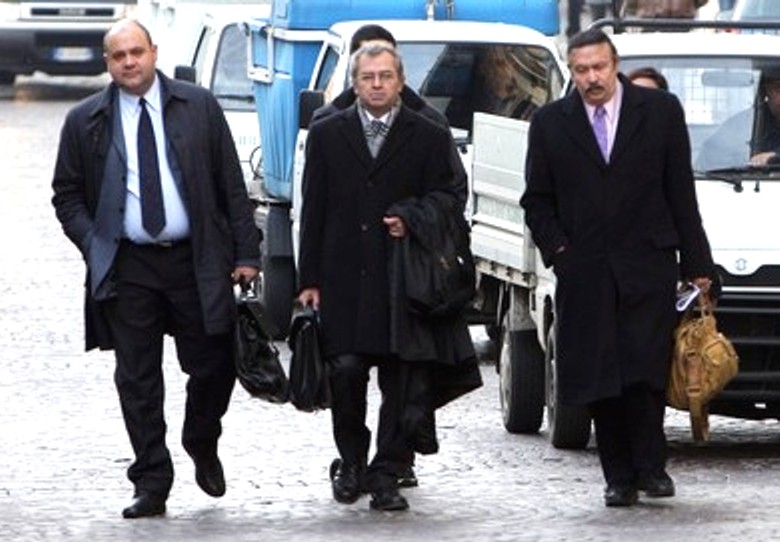
Rudy Guede Appeal: Sky News Italy First Report In Italian
Posted by Peter Quennell
[Micrsoft’s Internet Explorer Version 8 is having a widely reported problem showing these online Flash videos; other browsers all seem to work fine]
Libero Is Reporting, If Guilty Verdict, Life-In-Prison Sentences A Possibility
Posted by Tiziano
Please click above for Libero’s analysis posted tonight on their website. A translation:
MEREDITH, A DECISIVE WEEK, FINAL VERDICTS EXPECTED.
It is a decisive week for the final verdicts for the murder of Meredith.
Indeed the appeal trial of Rudy Guede is listed for Wednesday, while on Friday the summing up by the prosecutors in the first stage trial of Raffaele Sollecito and Amanda Knox, for whom the verdict is expected in the first days of December, will take place.
The final judgment is very much anticipated, because it will decide whether the three accused are in fact responsible for Meredith’s murder. Their position is very grave no matter what, as the charges underline.
In the meantime the lawyers for Guede, Biscotti and Gentile, have explained that their client will make a voluntary statement and that they will ask for the reopening of the investigative debate to allow for the carrying out of an expert investigation on the blood-stained towels with which Guede said he padded the fatal wound to the neck suffered by Meredith Kercher.
The two criminal lawyers thus intend to demonstrate that the Ivorian did indeed attempt to help the young woman who was knifed by someone else, while he - according to the accused’s own version - was in the bathroom.
Thus, while the Ivorian claims he is innocent, the GUP condemns him: “He actively participated in the aggression in the context of an extended sexual game, which was furthermore carried out resorting to strong-arm tactics, ending up in sexual violence and murder in the face of the persistent resistance of the victim”.
This homicide, according to the judges, also saw the involvement of Rafffaele Sollecito and Amanda Knox.
On Friday PM Manuela Comodi and PM Giuliano Mignini will delineate further the prosecution’s position, and it is not to be discounted that the decision will be life in prison. About the beginning of December the court will resume for final sittings.
Monday, November 16, 2009
The Actual State Of Play: The Status Now And What Is Coming Up
Posted by Michael
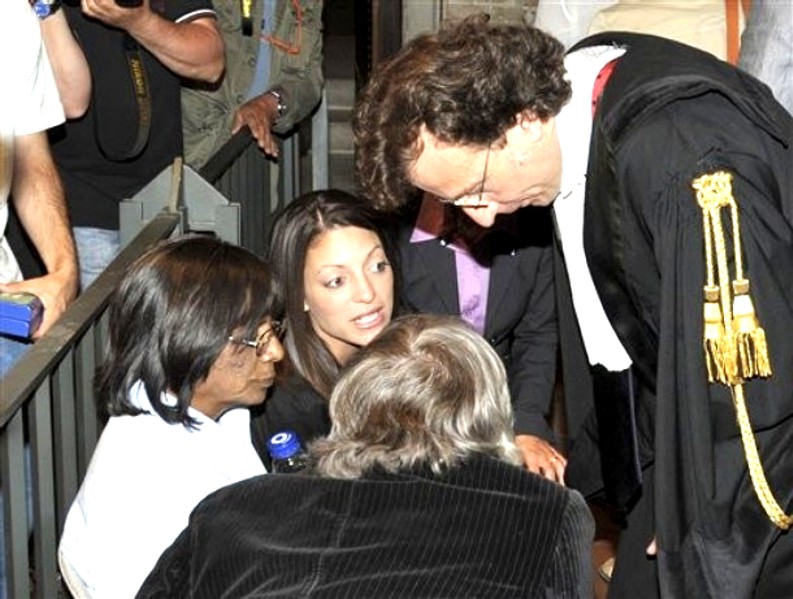
[above: Meredith’s family gets briefed on the proceedings and prospects last June]
The excellent pro-Meredith LA7 documentary that Nicky reported on below would have moved many Italians.
But, apart from some of the claims from Seattle, it is unlikely to have given them many surprises.
Those in Italy have often been able to watch the court proceedings directly, Amanda Knox’s seemingly misconceived stint on the stand included, and the Italian newspapers and networks have done a pretty exemplary job of the reporting. Those there who follow the case will have a highly informed and very accurate understanding of what the evidence points to - that it pretty well overwhelmingly points to the notion that the right defendants have been tried and the case against them is strong.
For non-Italians, though, arriving at a good take on the case has been very much tougher. UK and US followers have had to rely on far fewer media sources, and the biased ones have often drowned out the few good. Be it due to inherent prejudice within certain national media, jingoism, financial opportunism, a simple desire to sensationalize or turn what should be hard news into entertainment, language and cultural barriers, or sheer laziness, the reporting on this case has fallen very far short of the “duty” of the media to inform.
To make matters worse, the media have been affected by third-party influences. Most notably, the ostensibly pro-Amanda-Knox campaign has tended to muddy the waters with aggressive anti-Italy, anti-prosecutor and anti-investigator propaganda, and some highly peculiar takes on the real facts. The US media in particular has gone out of its way to provide them with a willing platform, and it has too often relied on the campaign for main information on the case.
It seems a sad day for the media and for truth in general when the public is left to rely largely on the families and representatives of the accused for their information. As Commissario Montalbano points out below, the PR campaign and the slanted reporting will actually have zero influence on the court. And we hear from the inside that it is likely to have zero influence on the US government, and in particular the State Department (the foreign office). But it certainly has left in its wake a pool of angry and confused people who think Italy is up to something nefarious.
So, what is realistically the state of play for the accused, Amanda Knox and Raffaele Sollecito? How strong is the case against them, what is the verdict in early December likely to be, and what are the prospects for appeal?
Bear in mind first that the elements of the case of the prosecution had jumped a large number of judicial hurdles on the way to trial for which there is no equivalent in the US and UK systems. Judge after judge after judge reviewed the emerging case, and Judge Micheli showed how formidable it was when he committed Knox and Sollecito to trial in October 2008
And the prosecution seems to have presented at trial a very robust case against the accused, within a very compelling overall framework, comprised of behavioral, witness, forensic, and circumstantial testimony, and self-incriminating testimony of the accused. The real strength of the case lies in the whole damning picture when all the elements are drawn together.
A defense explanation can be attempted for any one piece of evidence taken in isolation, and sometimes such pieces do seem weak. But when they are all brought together, the whole seems too much, too large a wall for any defense team to break down. A regular poster on the case summed it up with this metaphor. Imagine the case against the accused being a swimming pool. Now in that pool there are no sharks - but there are many dozens of piranha fish. They will strip you to the bone far faster and more effectively then any shark. This seems in essence what the response of the defenses now faces.
Convictions and sentences for both defendants early in December do seem to be more or less assured.
So what does a well-informed and fair-minded native Italian who really understands the Italian legal system think of the chances of acquittal for the accused? Our frequent commenter Yummi, who writes from Italy, was asked about the prospects for a guilty verdict, and the likelihood of a prosecution appeal in the case of an acquittal. Yummi had this to say:
A trial in the Italian justice is an event in which the most important part is played by the written sentence (so called “sentence report”). The prosecution would give up the appeal only if the written motivations appear to them obviously unassailable, so to make it easy to predict a second failure. But in all other cases appeals by the prosecution are frequent, sometimes even on guilty verdicts. In this case an appeal by the prosecution would be real and almost certain in case of acquittal.
But it is extremely unlikely that AK and RS are found innocent in the first instance. Not because there is any proof 100% good, any single piece of evidence alone won’t be able to produce a guilty verdict, but even if the pieces of circumstantial evidence are not a decisive proof taken one by one, they are too many, and too systematic. There is practically no way to come out from such a web of physical indicators, the defendants are implicated.
Yummi is not alone in this view. Most tellingly, Amanda Knox and her family are said to have been warned by her Italian lawyers, Luciano Ghirga and Carlo Della Vedova, to expect a guilty verdict. And Knox’s family are now more than ever talking about an eventual appeal in the US media. These are remarks by the mother of Amanda Knox.
There’s been many people that have told us that’s not how it works. Just because you’re innocent, you’re not found innocent, at least… at this first level, and that normally true justice doesn’t happen until the appeals process.
By ‘“first level” Edda Mellas means the current trial. In effect, she seems to believe that, in the Italian process, almost everyone is found guilty in the main trial, and the real business and the acquitting is done in the appeal. This happy talk about the appeal has been quite common from the Knox camp of late. This suggests that the supporters of Knox and Sollecito are expecting a guilty verdict and are now hanging all their hopes on that appeal.
Is it in fact correct that the appeals court is where the real business is done? In effect that it is almost automatic that Knox and Sollecito would be found guilty in the trial, and that then it’s almost a done deal that they will be freed on appeal?
First, it must be noted that we’ve heard similar happy talk before. Leading up to and during the early stages of the trial, the line was that Amanda will prove her innocence in the trial itself, most especially by getting up on the stand. That clearly hasn’t worked out that way, and as the trial is almost at an end, the supporters are turning their attention instead to characterizing the appeal process.
What is the reality of the appeal process? This is how our Italian watcher Yummi describes it:
Appeals are usually very similar to first degree trials in their overall figure. Basically it depends on what are the aims and strategies of parties in the appeal. If the outcome in the first degree is obvious, most likely it will be obvious in the appeal. Many appeals in Italy don’t take place just to overturn the first degree - i.e. the fact that a defendant is guilty often is not questioned - often they are made just to introduce minor corrections to the first sentence.
So what do the actual appeals statistics say? The statics on the success rates of appeals in Italy are in fact not good news for those convicted.
- 70% of appeal cases end with the confirmation of the original verdict: 25% of these with a confirmation of the sentence at the original trial, and 45% with a reduction in the penalty.
- The other 30% of appeals cases end with 10% of them lapsing due to expiration, 8% for NDP procedural reasons and only 12% overturning the verdict.
So the reality is that only a mere 12% of all appeals result in the overturning of a guilty verdict. This seems very out of step with what Edda Mellas has been claiming. The facts of the matter in this case seem to be that (1) the returning of a guilty verdict at the end of the trial is very high, and that (2) there is a negligible chance of that guilty verdict being overturned on appeal.
The reality therefore is that things are not looking at all good for the defendants, Amanda Knox and Raffaele Sollecito.
And even worse, because there are three appeals, one each, they may really tear apart from one another now and on appeal go their different ways - as, seemingly, will Rudy Guede.
We are now coming to the end of what has been a very long sad tough process indeed, most of all for the family and friends of Meredith Kercher. I can only hope, that whatever the outcome, they are given the truth and repentance they seek. And that they finally are able to find some closure and truly lay their daughter to rest in peace.
The Kercher family on the second sad anniversary of Meredith’s death a few days ago expressed their heartfelt desire that eventually, finally, soon, they and the world can stop remembering Meredith as a victim and news item, and instead as a whole person - the truly wonderful person that she was.
It is my reading here that we will reach that point early in December of this year, in that Perugia courtroom.
Wednesday, November 11, 2009
The Best Meredith-Case Documentary Ever - One Intensely Compassionate To Meredith
Posted by Nicki
As many here know, I am an Italian-American who lives and works in Milan in northern Italy and who follows the case closely in Italian.
On TJMK here I have posted repeatedly on the DNA dimension and on the public perceptions in Italy of Meredith, Amanda Knox, and the campaign.
A week ago today, those public perceptions sharpened very noticeably.
One of the three largest national TV networks here, LA7, broadcast a one-hour documentary on the case. This was months in the making, the most costly production to date, and compelling for the depth and objectivity of the reporting.
And absolutely compelling for its extreme compassion toward Meredith, a loved and revered figure in Italy, for whom the cruel and untimely nature of her passing has led to a lot of outrage and sadness.
If there were any dry eyes among the very large Italian viewership of LA7 by the end of the broadcast, it would be quite surprising.
The production’s power to move comes from its placing of Meredith right at the beginning (her church and her chaplain), repeatedly in the middle (people in England who knew her, including one who was with her in Perugia) and right at the end, where there is a scene in the cemetery where Meredith was buried of almost transcendental beauty and sadness.
The documentary (so far) is only watchable online in Italian, with Italian voice-overs of the many interviews that were carried out in English in the UK and in Seattle.
- 1) The World of Amanda, The Destiny of Meredith, Part One
- 2) The World of Amanda, The Destiny of Meredith, Part Two
The arguments of the Knox supporters in Part One came across as tired, weak, clutching at straws, playing on emotions, and avoiding hard facts, and well-informed Italian viewers probably tuned out the droning and confused Ann Bremner. Sympathy shown for Meredith and her family was around zero.
In sharp contrast, the Croydon and Leeds segments on Meredith in both parts, especially the second with the deeply-hurting Samantha Rodenhurst, sounded new, fresh, authentic, interesting, and very moving, and would have had Italian viewers transfixed. And Charles Mudede in Seattle was extremely effective in puncturing FOA hype.
For those with no Italian, which seems to be the huge majority of our readership, we have posted below a large number of still images from the broadcast, to convey the ground that was covered in Italy, the United States, and England..
The producers were largely guided, we believe, by the Italy-based American journalist Andrea Vogt, who appears several times to give effective commentary and who is credited at the end.
There is nothing really new on Amanda Knox, who herself does not feature very prominently, and virtually nothing at all on Raffaele Sollecito or Rudy Guede.
New in the Italy segments is an interview with the prosecutor, Mr Mignini, who observes that the FOA’s claims about the true strength of the case are simply flat-out wrong. He notes that they are not based on a thorough knowledge of the evidence presented or of the Italian judicial system.
New in the America segments are interviews with four University of Washington students, only one of whom thinks Amanda Knox is innocent and then with no great conviction. Interviews with two of Amanda Knox’s teachers at Seattle Prep, who found her to be pretty normal at the time. And highly insightful commentary by the Seattle journalist Charles Mudede.
And new in the England segment are interviews with Meredith’s chaplain at her former school, who also conducted her funeral service, and with Kirsty Whalley, a reporter for the Croydon Guardian. Also with a Croydon caféteria owner who served Meredith many meals of cheeseburgers and chips, and with four students at the University of Leeds, who were keen to see the thing over and properly reported upon so the Kercher family could perhaps find some peace.
Perhaps most moving of all were the many short segments with Samantha Rodenhurst. Samantha and Meredith became very close friends in the few weeks they were together in Perugia, and Samantha was one of the girls Meredith shared a pizza with on a bed, watching the movie The Notebook, before Meredith headed home to her final cruel fate.
We will later add some translations to the three posts directly below. [Many are now added.] The overwhelming sentiment of the program seems to me this: May Meredith finally rest in peace now, and her family be given respite from the Knox hype of the cruel campaign.
I doubt that many Italians feel any differently. Amanda Knox herself and the campaign have ensured that.
LA7 TV’s Documentary On Meredith’s Case #2 The American Segments
Posted by Nicki
Below: One of many good images of Seattle which included some specially taken from the air

Below: The home of the Knox family where Curt Knox and daughter Deanna were interviewed

Below: Curt Knox being interviewed and showing four childhood photographs of Amanda Knox
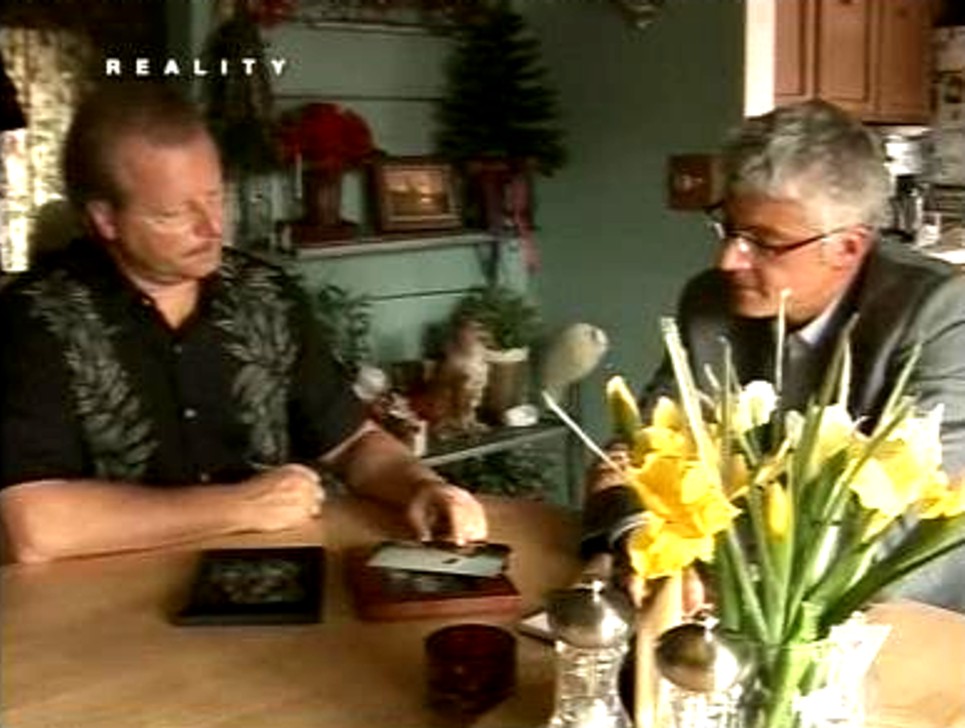
These are childhood images of Amanda. The FOAK is quite independent of our family. They concentrate on analysing the case and raising money for us. They are nothing to do with the family! The Kerchers lost their daughter, but we can still hope to get ours back.
Below: One of the childhood photographs shown of Amanda Knox, seen here playing a guitar
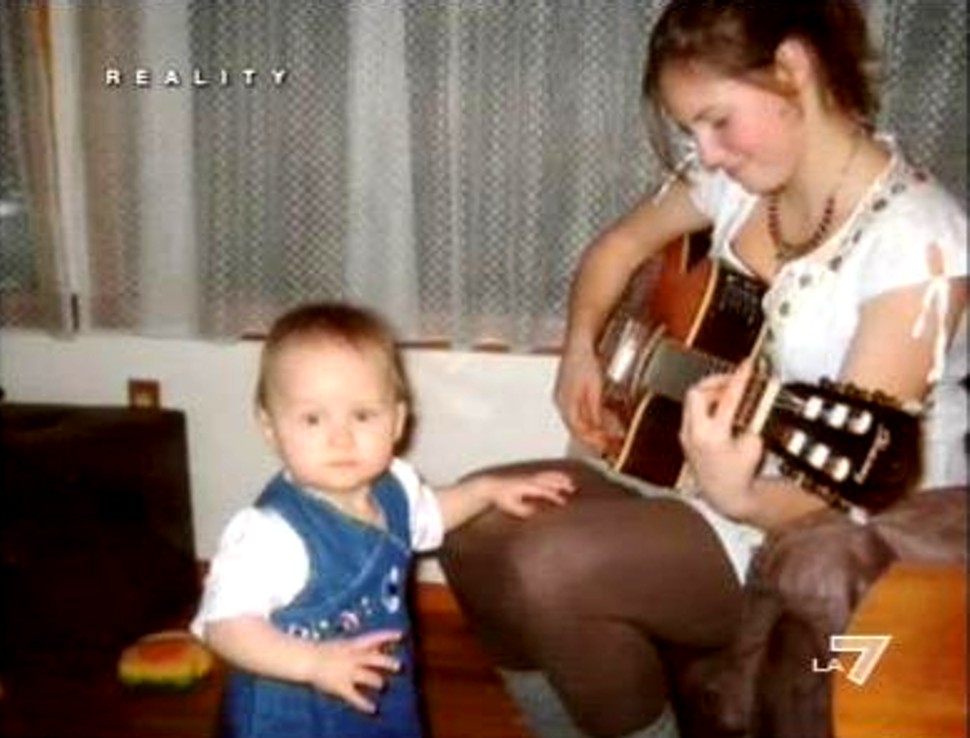
Below: Amanda Knox’s sister Deanna Knox being interviewed in the garden of her father’s home
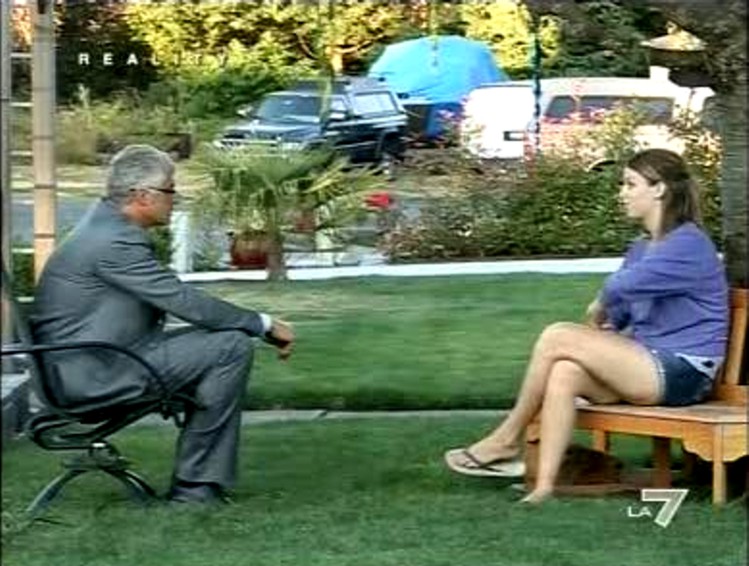
Below: Segment with part of a YouTube video showing Amanda Knox aopparently a bit drunk

Below: A Seattle street with crowd; many lively crowd scenes here and in the UK were included
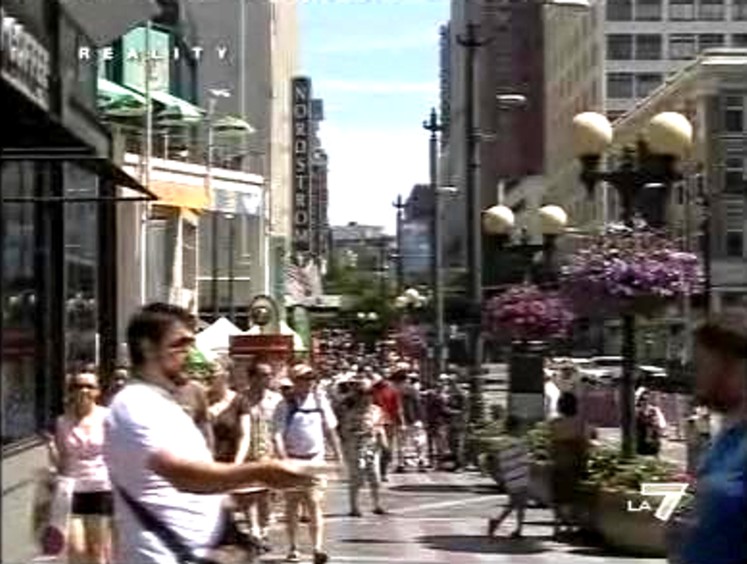
Below: First of four students at University of Washington; only one strongly believed Knox is innocent

Everything is possible. It’s always a possibility - you have to study her personalty in depth and the eventual psychological motivations which could have led her to commit the murder. It’s the only thing I can say. I don’t know whether she took part in the crime.
Below: Second of four students at University of Washington; only one strongly believed Knox is innocent
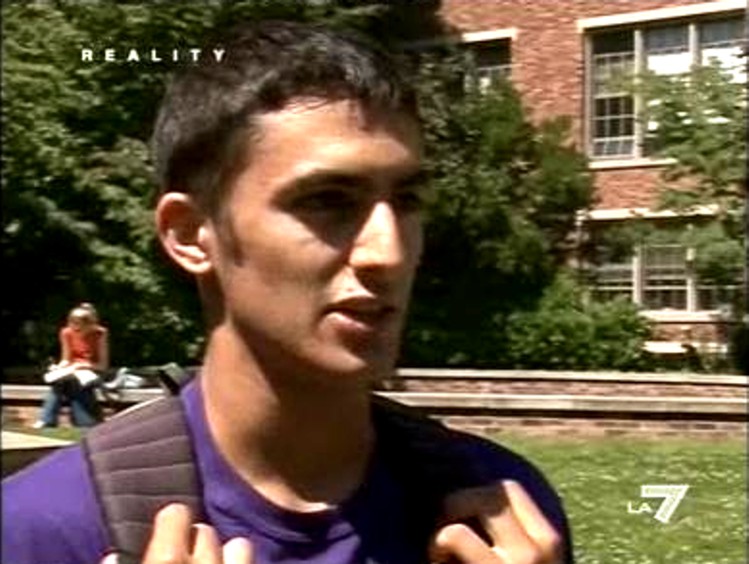
The story changed so many times that I think she is guilty. She changed versions several times. I’ve stopped following the story because the media try to take away attention from it and then go back to make the interest in it rise again. But I think that she is guilty.
Below: Third of four students at University of Washington; only one strongly believed Knox is innocent

I knew her, yes, we were at high school together at Seattle Prep. [Q: And you were in the same class?] Yes, in the same class. [Q: And what do you remember?] She was very nice - a nice person, I didn’t know her very well ... I could never have imagined that she could be involved in such a thing. It’s a tragedy because I believe she didn’t commit the murder. I follow the trial and it’s sad because for me, she seems innocent. I don’t really believe that she committed the murder.
Below: Fourth of four students at University of Washington; only one strongly believed Knox is innocent
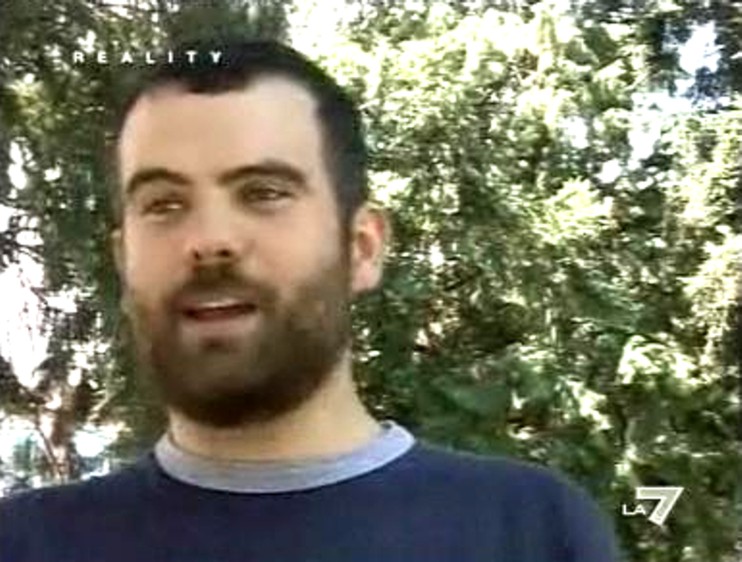
I don’t know - I haven’t any idea. I think that this case has been manipulated too much by the media. It’s very difficult to discern between media sensationalism and the truth. So it’s difficult to express an opinion.
Below: Dr Taso Lagos of UW spoke weirdly of cultural differences - and Knox somehow being the real victim
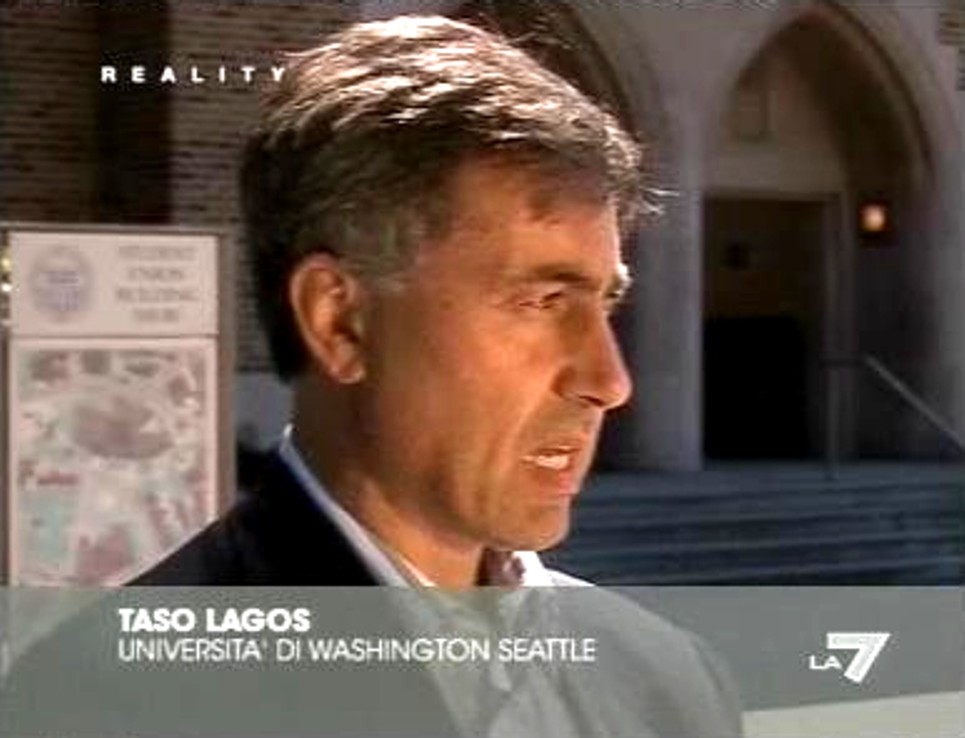
Below: Offices of Seattle magazine The Stranger where campaigner for truth Charles Mudede works
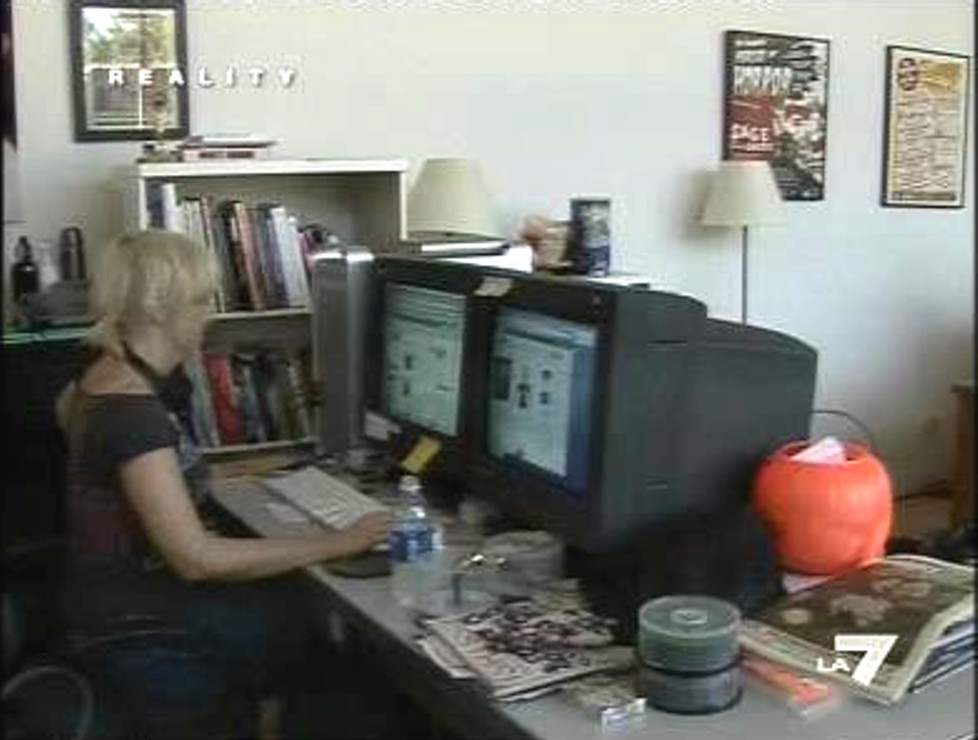
Below: Charles Mudede, perhaps first US journalists with an in-depth piece sympathetic to Meredith
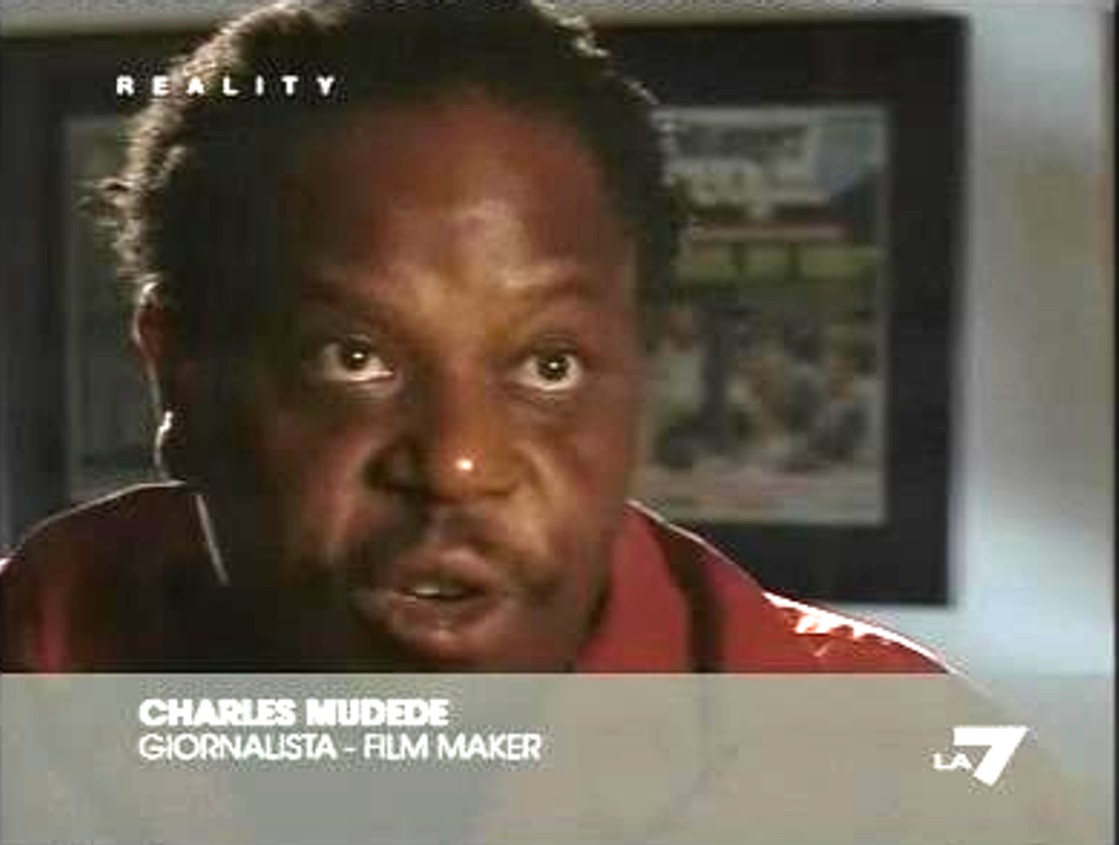
Here we don’t talk enough about Meredith, and that is always because of the distance. We don’t talk about who this wonderful English girl really was. I don’t know whether you’ve noticed it, but in the American press, yes, Meredith is named as the person killed, but they talk very little about her and about what her parents are undergoing. You have to consult the English papers to read this; you don’t find it in the American ones. This is the result of an attitude which is favorable towards Amanda, because you don’t have a connection with the victim as you would have, say in England.
Amanda was a bar attendant and also worked in an art gallery in the university area. She was a student of European languages. She practised yoga and played soccer: all characteristics of a normal American education. Amanda grew up in a middle class family in West Seattle, differently from how the British press described her as a rich girl. She isn’t. Amanda belongs to the middle class, typical of this city. Here there aren’t many poor people, or rather there are, but not a whole lot as in other cities. While the rich tend to not make themselves very visible.
There seems a dark side to Amanda’s personality. I think this dark side is the same as in many young people of her age. She wanted to experiment, at times with drugs, at times with sex. When I did research on her I found a police statement where it was written that Amanda had taken part in a party that ended up badly. She had to defend herself in court on charges of disturbing the peace, but it was nothing sensational. I don’t believe that her dark side is something exceptional even. The idea that she was beaten up and maltreated by the Perugia police makes me laugh - it’s an exaggeration. I mean the police have to do certain things which may seem a bit nasty but this is not unusual - it happens here too.
Below: One of various shots of grounds of Seattle Prep where Amanda Knox went to school

Below: Two of Amanda Knox’s teachers describe experiences with her as seemingly normal
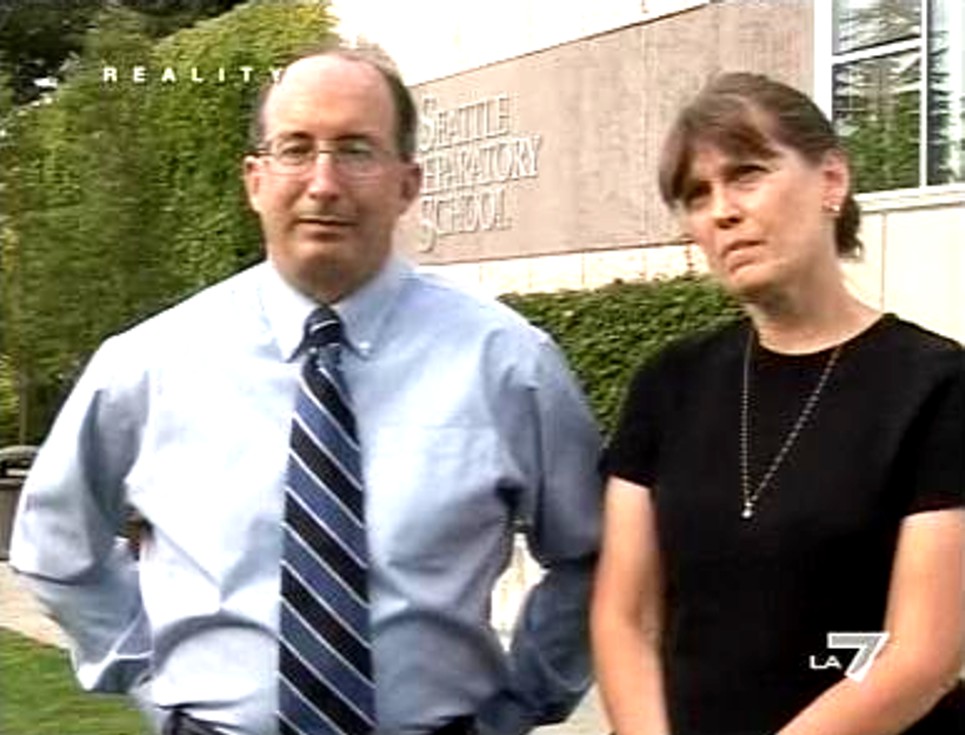
Below: Andrea Vogt, American reporter based in Italy, provides some excellent in-depth commentary
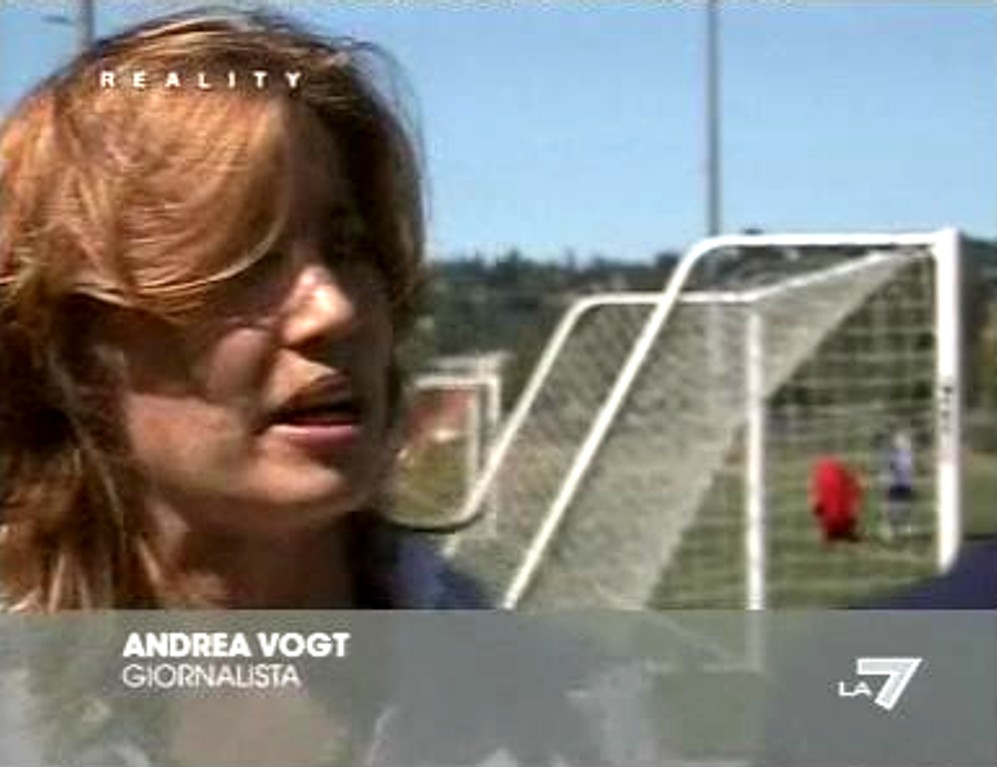
“She was a girl like so many others here in the Pacific north-west. She was sporty, she liked playing sport, going out. She spent so many of these beautiful days running or playing football. That’s what the girls here in this area do.”
LA7 TV’s Documentary On Meredith’s Case #1 The Italian Segments:
Posted by Nicki
Below: The Corriere newspaper’s headline reads “Justice for Meredith” reflecting dominant public opinion
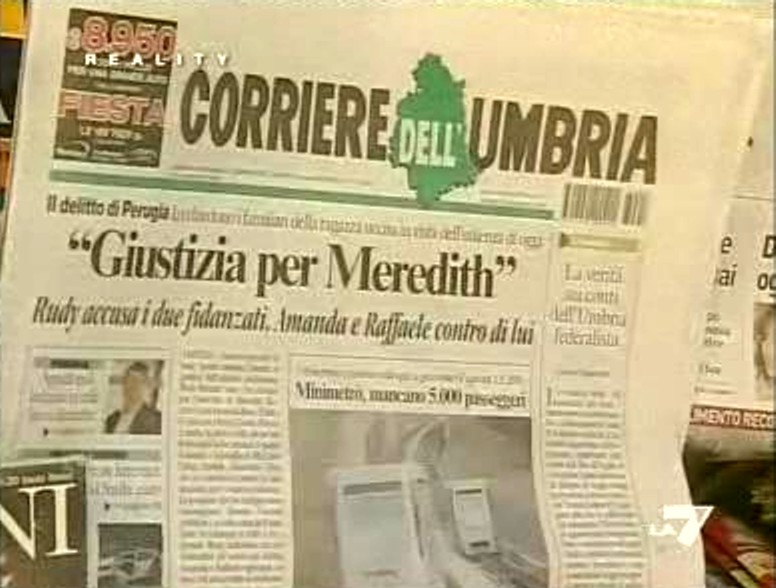
Below: Perugia students sitting by the fountain in the Corso Vanucci, as they do every night of the year
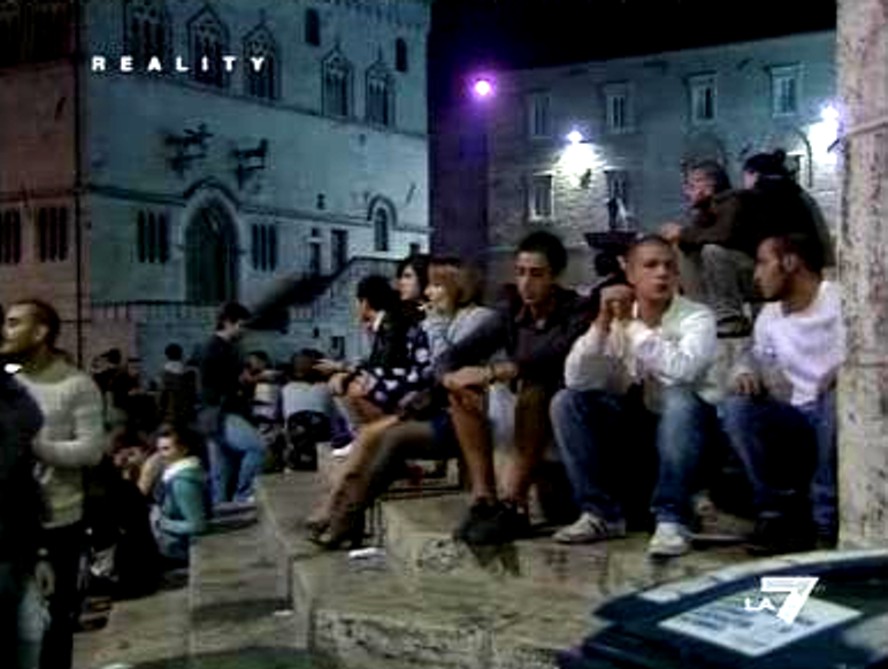
Below: The pressroom adjacent to the courtroom which many journalists prefer as they can type and call out
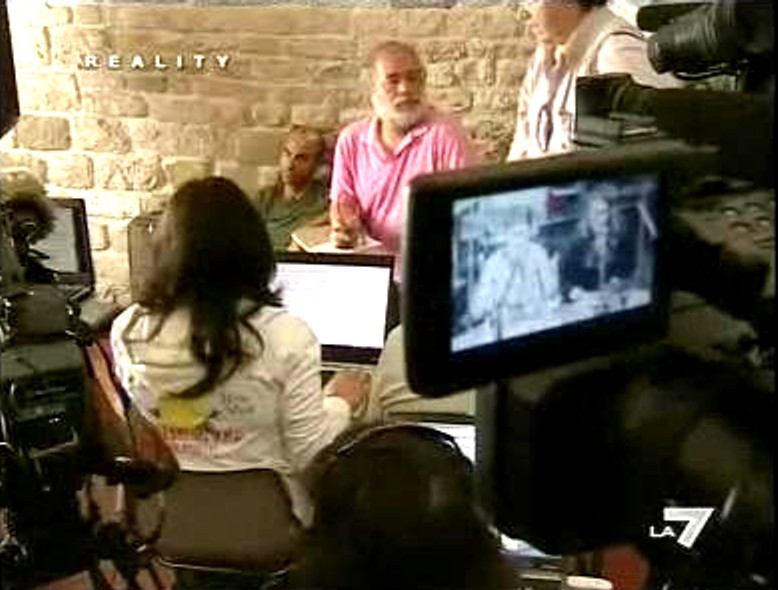
Below: Amanda Knox on the witness stand presenting testimony on her accusations against Lumumba
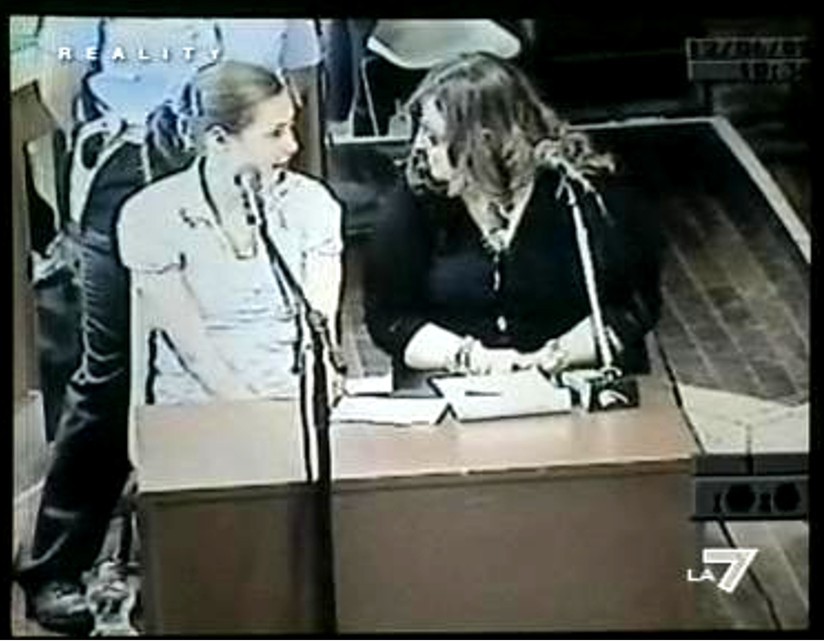
Below: Meredith’s mother making a statement; thereafter the family is shown being seated in the court
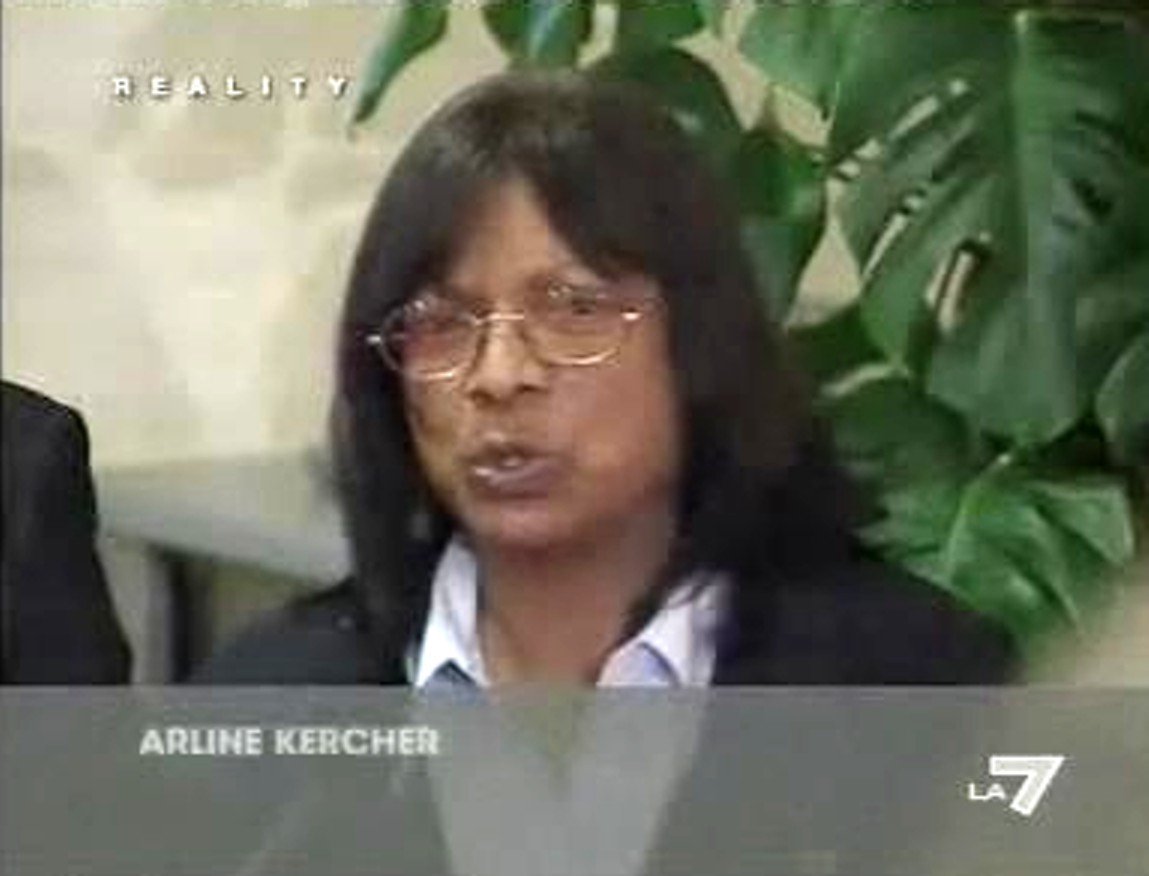
Below: Prosecutor Mignini is shown several times in an extended interview on misleading by FOA and US media
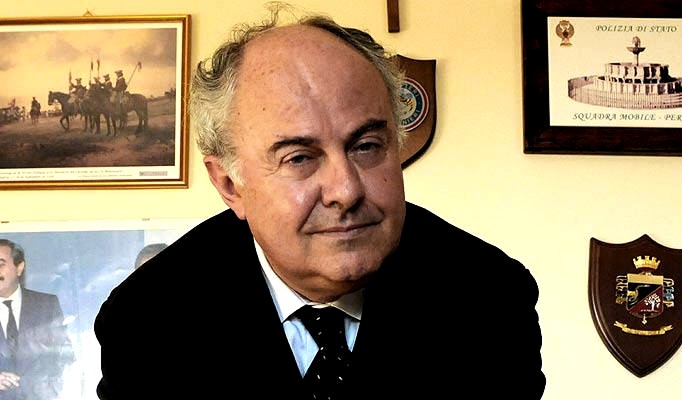
“The American commentators with no in-depth knowledge of the case and little if any understanding of the Italian justice system are severely clouding the issues. They show an extreme lack of knowledge of the facts of the case and of the Italian system. In this case the accusation of the prosecution is based on the existence of serious indications of guilt, and this hypothesis has been supported by the GIP (the judge heading the preliminary investigation), by the court which confirmed the remand in custody, and by the Appeals Court.”
Below: Andrea Vogt, Italy-based reporter for the Seattle PI and the Independent, comments on the process
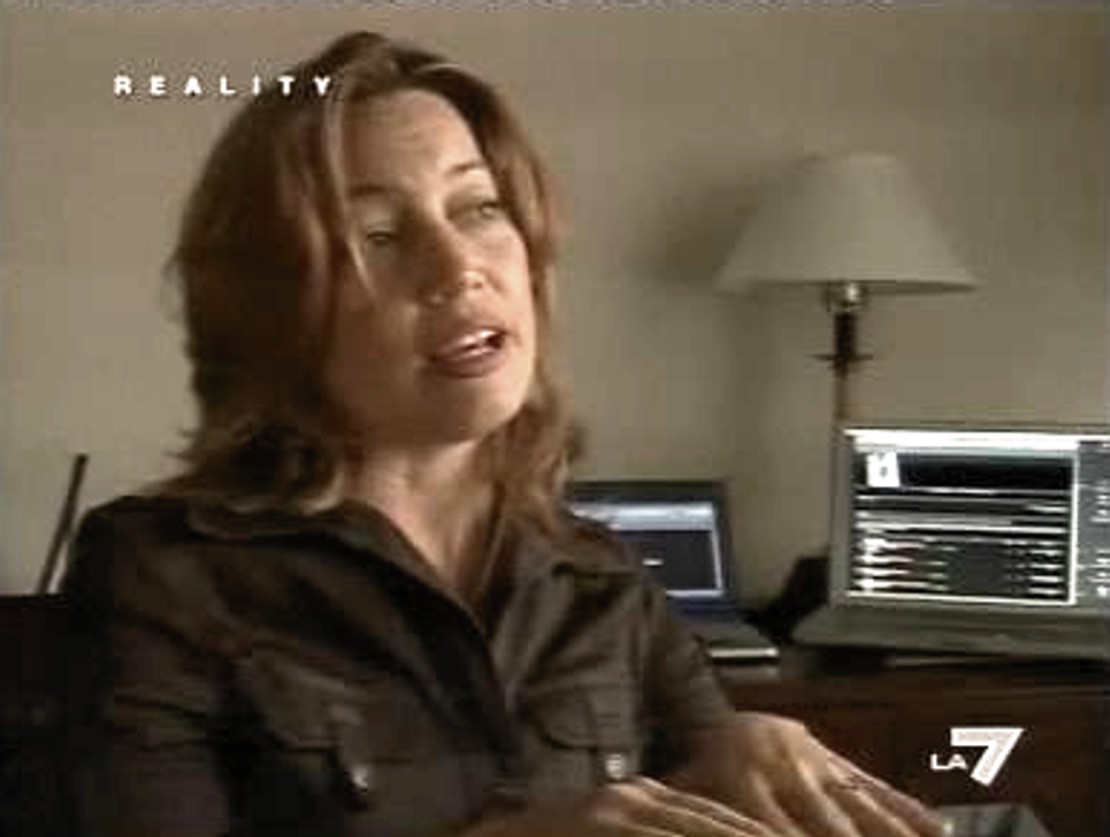
Below: Andrea Vogt draws attention to “blog wars” and shows the camera TJMK and PMF forum
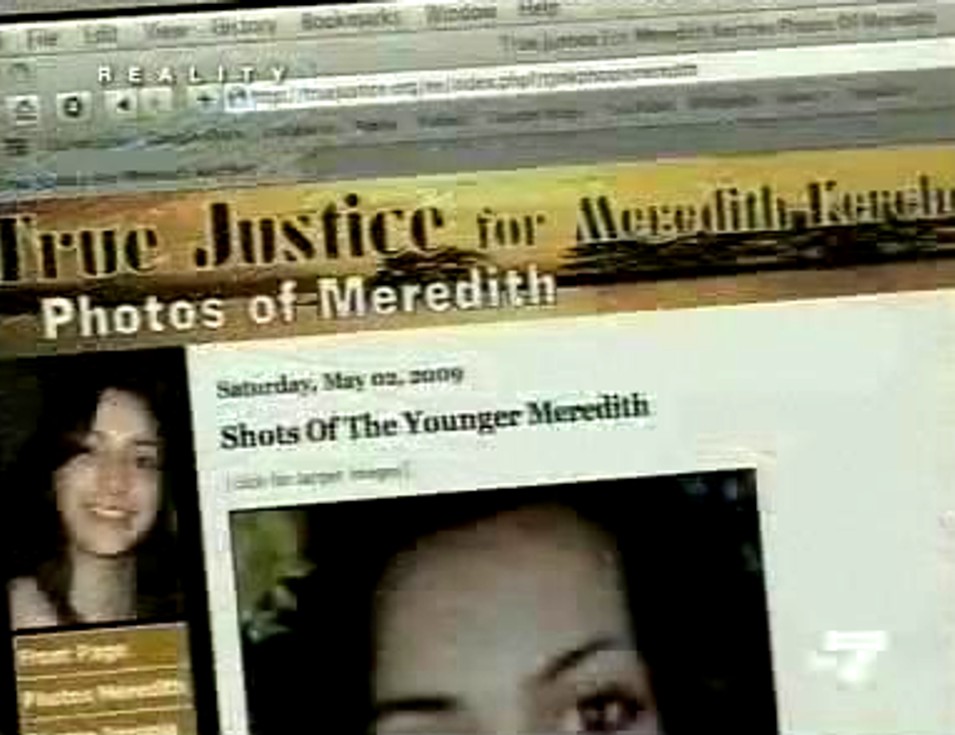
Below: Patrick Lumumba makes some sharp remarks about the false charges against him by Knox
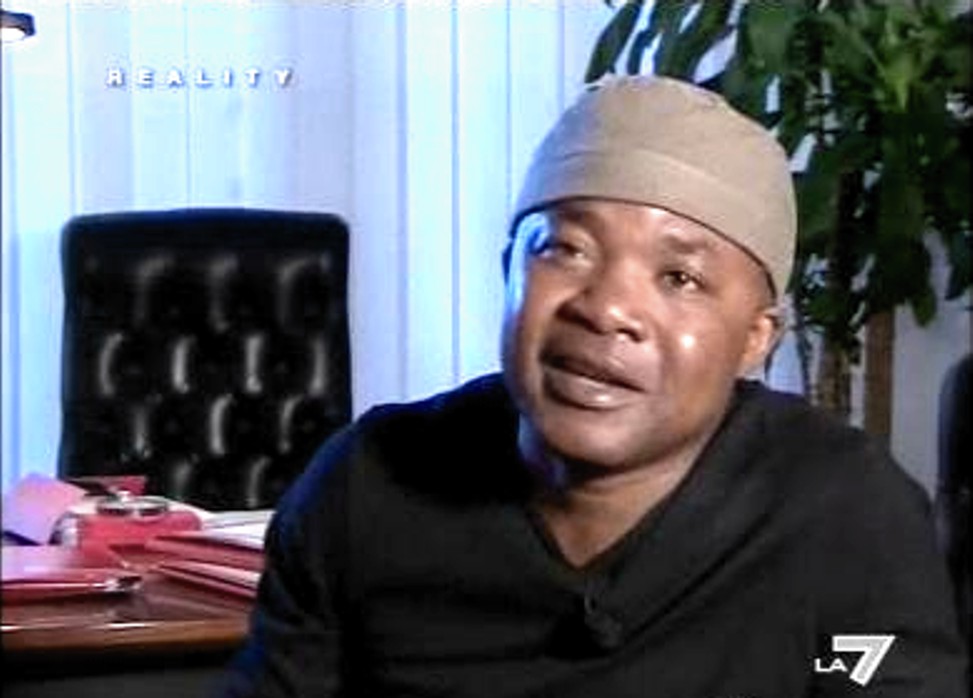
On Meredith: “Very reserved, a very kind person, I think. Every time when I met her she had a smile and “Ciao! How are you?” We talked like this. There was always this group of English girls. I first noticed her because she spoke to me about a Polish vodka. She to me, “Ah, you’ve got some here.” I asked her if she knew it and she replied yes, that she used to work in a bar in England where they used this vodka for making Mojitos.”
On Amanda Knox: “In this month and a half, two months that I knew Amanda, I can’t claim that I got to know her that much. But at least I spent that time with her at the bar ... and therefore I’m in the position to understand that… when she’s lying…. And I don’t believe her. She tried it, but it didn’t work.”
Below: Mention of Rudy Guede’s conviction last October and his upcoming appeal in November
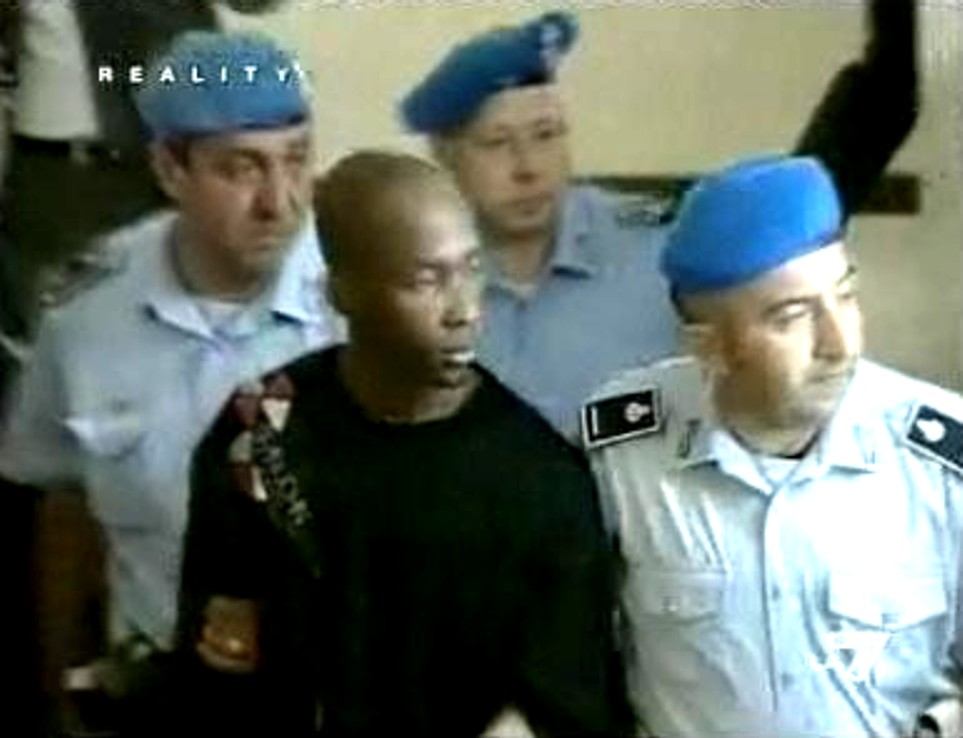
Below: Just this one brief shot of Meredith’ s house, after dark, as it was on the night in question

Below: Gates of Capanne Prison where Amanda Knox has been held during the hearings and trial
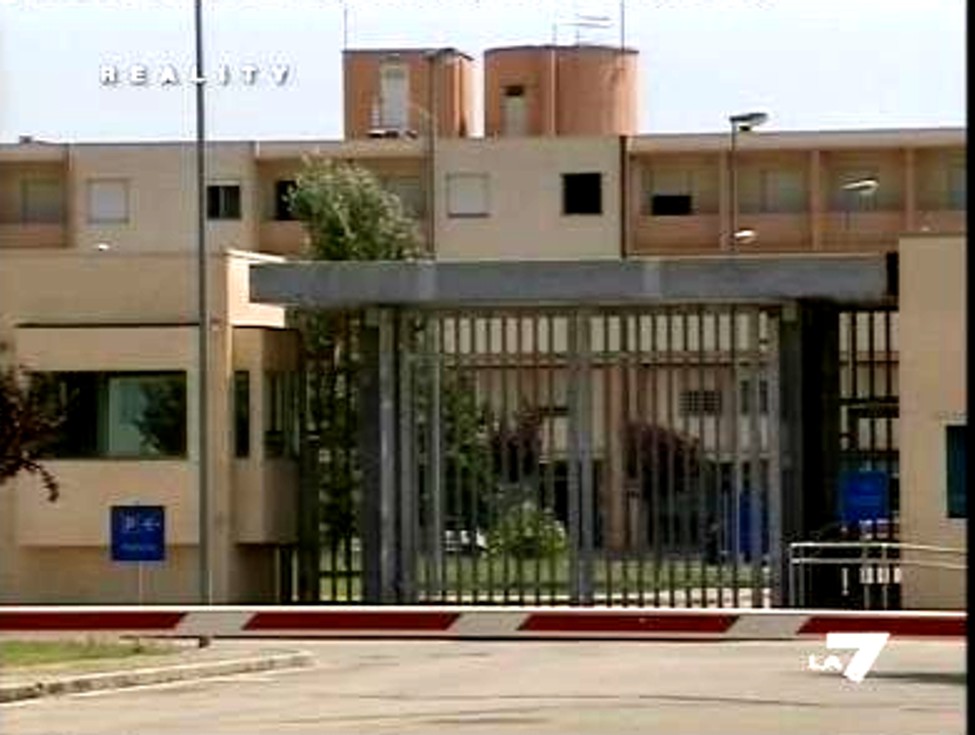
Saturday, November 07, 2009
What Seattleites Are Thinking: A Sample Of Views On Meredith’s Case
Posted by Professor Snape

I am a Seattleite, and I feel very passionate about supporting the quest for justice for Meredith Kercher and her family.
I usually never wander up and intrude upon people. But I have been tending to pick Europeans out of crowds and talk with them about the case. I have also inquired about how people feel about the case while waiting in long lines at Disneyworld in Orlando and at Disneyland in California and most recently at Whistler in British Columbia on the gondola.
Recently I have found myself apologizing for my even being from Seattle. I have a real sense of community, and I am embarrassed by how low the Knox PR campaign actions have brought Seattle. And I am sickened over the mischaracterizations of the lovely and spirited Meredith and of how she was brutally and excruciatingly murdered.
Seventy-five percent of the people I have talked with elsewhere expressed zero knowledge of the case. The other twenty-five percent indicated they knew of the people in the case, found it shocking and were sympathetic to the murdered girl’s family and wondered, as we all do, how anyone could do such a horrible thing. Some expressed opinions as to guilt and others didn’t.
Ever since Edda Mellas first hung up the phone with Amanda very early on the morning of 2 November 2007 Seattleites have been the main subject of the aggression of the Knox campaign and its plot to spin webs around the media in a grand attempt to discredit anyone who speaks out against their (to me seemingly immensely disturbed) hero and, in too many cases, meal-ticket.
When the likes of the fatuous Linda Byron of Seattle’s KING 5 have propagated their ill-informed stories on the case, too many Seattleites have concluded at a very superficial level that they know everything there is to know about the case. And so they look and think no further. “Those meanie Italians… ”
I don’t believe most of the people I talk with in Seattle actually outright support Knox. It is a shallow thing, and most people claim to be reserving their judgment.
That was of course also the case with OJ Simpson. Many thought OJ was probably guilty and yet they wouldn’t say it, and then it was devastating when he got off. Then everyone proclaimed they just knew he was guilty, and what a joke about the decision. They blamed the injustice on a shoddy judicial system, not on their poor monitoring of the system and the case..
While I cannot reveal who the Seattleites were, to avoid their becoming targets of payback (names are changed), I would like to share the following comments. These were made by colleagues, service providers and friends around Seattle who fell into the same percentage of interest as the other citizens and non-residents I also spoke with, so this is something of a valid sample.
****************
Seattle Editor Harry Perkins said, “My impression of the Amanda Knox trial is one of mystified amazement “” the willingness to give her the benefit of the doubt at an elevated level because of her youth, her background, and her physical attractiveness shouldn’t have taken me by surprise…but it has.”
Washington State Certified Public Accountant John Dutch had a strong opinion about the case and listened fairly to what I know about it. He wanted me to keep him up on the case and he had this to say,
“A few weeks ago I read an article in a national newsmagazine that indicated that the Italian prosecutor in another case had issues around evidence and even accused a defense attorney of being guilty of withholding of evidence when, in fact, he wasn’t. My impression, based on the article, was that the Italian process around crime scene investigation was poor and that, based on their legal tradition of Napoleonic Law, that it would be hard for a defendant to get a trial that we, in the USA, would consider fair. So, how does that relate to the Amanda Knox case? Same prosecutor, same legal tradition, ergo Amanda Knox is probably not getting a fair trial.”
Washington State Juvenile and Criminal Psychologist Calvin Richardson wrote, “I’m not sure how average I can be with regards to being a Seattleite. While I’ve lived in this state my whole life, I’ve never really considered myself a Seattleite - although I’ve worked in downtown Seattle. I can recall the first moment I heard about the Amanda Knox case. My memory of hearing about this incident is when it was reported that the foreign media was calling her Foxy Knoxy.”
“It made me think of how Michael Jackson was referred to as “Wacko Jacko”. And, quite honestly, that turned me off to the entire matter. The rest of the information I have unfortunately absorbed is that there was some sex-crazed, multi-partner-swapping party that ended with a girl being stabbed to death and American Amanda Knox is a bi-sexual, homicidal nympho.”
“At the point of the story reaching a sensational level where a catchy headline or title is used, the story becomes about entertainment. My proof? Didn’t the story have a little spot on the TV. show “Entertainment Tonight”? Help me out here: when did horrific murder scenes become entertainment (excluding Steven Segal breaking someone’s arm at the elbow - which, come to think of it, isn’t entertaining either)?”
“There can be no bigger disservice to Meredith Kercher’s family, the Knox family, or the Italian system of justice, than to turn a horrific crime into a sassy, Dr. Seuss catch-phrase so that papers can be sold.”
“I don’t know what the “evidence” is that damns Ms. Knox; I don’t know the circumstances which profess her innocence. And I certainly know nothing about the judicial procedures of the Italian court system. But I do know that if Ms. Knox is found guilty, she will have to suffer the consequences of her actions. It will be a verdict that I will probably not lose sleep over. If Amanda Knox killed Meredith Kercher, then she absolutely deserves whatever comes her way as a consequence.”
“Moreover, if Amanda Knox killed Meredith Kercher in some sex-play game gone wrong, then I am thankful that she’s being tried in Italy. My perception of foreign judicial systems is that they keep their punishments punishing. In my opinion, American justice is like spending the weekend at your grandma’s house: it’s not your favorite place to be, it’s not really fun and exciting, it seems to last forever… but in the long run, it ain’t so bad.”
“I feel American Justice has lost sight of the importance of punishment. “Justice” must maintain its punitive element of retribution, else it ceases to be just. If Amanda Knox didn’t kill Meredith Kercher, then a small part of me wants to say “That’s what you get for going to a foreign country!” And yes, I admit, that’s not a fair statement. But I have to be honest: I’m sick and tired of hearing about citizens from one country going to another country and then complaining about the treatment they receive.”
“Would I like to travel to Italy? HELL YES! It looks fantastic, I have distant family that originated from Italy, and the whole romantic aspect of Verona is very fetching. Will I go to Italy? Probably not: I don’t know the language, or the customs, and I would probably screw something up, get in trouble, and then I’d be just another crass American complaining that a foreign country is not more accommodating to my personal desires. And I’m pretty sure the entire World is sick to death with hearing about it.”
“Which makes me think there might be another crime happening because of all of this. I think that Americans are being presented as loud mouth, over-weight, egocentric, self-righteous Imperialists who feel that it is their birth-right to be entitled to Diplomatic Immunity the moment they step off their front porch. Deserved or not, you have to know that our biggest calling card as of late is a government that manufactured evidence to gain approval to invade a foreign country and “liberate” the people with Democracy - whether they wanted it or not.”
” I can’t think of anything more offensively pretentious… unless you want to consider Benito Mussolini’s quote: “Let us have a dagger between our teeth, a bomb in our hands and an infinite scorn in our hearts”. In which case, I appeal to the people of Italy: I forgive your Mussolini, if you forgive my Bush.”
“And I’m sure the press will find a way to make that as salacious as possible.”
Ian Kendrick, an aerospace compliance officer stated, “The difficult part in understanding the trial is the sensational and sound bite manner in which it is presented. The limited information I have seen regarding the facts on TV is encapsulated into a 3 minute sound bite at best. The focus is then on the lurid details, and as the trial progresses it is only the oddities (she smiled in court - gasp!) that are reported not as facts, not as information, but just sensationalism.”
“This gets to the deeper point of news is it truly news any longer? I’d argue it is simply reality show entertainment now broken down to the most sensational bite sized stories possible. You only focus for 2 minutes on any local horror, then off to the next. The follow up is limited and becomes ever shorter as the story grows older.”
Twenty year law enforcement veteran, Jack Bishop, summarized, “Although my law enforcement experience is limited to here in the United States and I have little knowledge of the Italian processes for jurisprudence I do believe I can comment to some degree on the phenomenon of what I call narcissistic innocence.”
“Although I believe it to exist almost everywhere it seems to be quite prevalent here in the Seattle area. When the world rotates around your mere existence and others reinforce that belief how could you be guilty of a crime? Of course not everyone gets it that you are special so you only choose to be with those who worship or at least appear to worship you.”
“These days I have both the good fortune and misfortune of working with people much younger than me. Their energy level is something I willingly try and tap into when mine is low but their level of self absorption is unbelievable.”
“This just feeds into their justification for their inappropriate actions and although I am treated with respects our culture of overvaluing youth is quite apparent. Unlike many Asian cultures that value the older members of the family here we have turned our children loose with the keys to the castle and then spend much of our time justifying our failings by justifying theirs.”
“That the Knox family would try and raise the level of the conversation on a political premise should come as no shock. In fact I would almost be surprised that they wouldn’t, what else could they do? That a community of like-minded narcissists would fall in line behind them is also not a surprise, I have seen it before when someone of affluence or power is charged with a crime in this environment.”
“People of affluence are determined to get their way; they always have and believe they always will. Only in this case they won’t. I can all but guarantee that Amanda Knox will be found guilty of this crime. The sad part is that much of the world will once again be exposed to what we should be most ashamed of, our arrogance.”
“I say let the Italians handle their own affairs. If they can make a clothes processor that serves both functions of washing and drying in one then I’m confident they can sort through the Amanda Knox trial without our help.”
“So what do I think about the case? Nothing. I do not have enough in depth information to make a reasoned statement about it. Instead it only serves to illustrate how poorly what we call “news” informs us.”
Karen Reid, a veterinarian working for a rural animal hospital said, “What do I care about the trial? Nothing except for the way the girl died was so shocking. I would hope the Italians will lock up whoever had anything to do with it. It’s as bad as all the kids being killed by their own families, sick. I hope the Italian courts are better than ours.”
“I’ve only seen news reports about the girl from Seattle. Her father is like always looking like he’s going to cry, it seems pretty staged if you ask me. And why is she always smiling? Geez, who has a big grin on their face in court particularly when charged with murder? That’s pretty spooky though I don’t think that alone makes her guilty.”
“And I heard there were no finger prints in the house. Come on, that’s a no brainer how that most likely happened! I think whatever the outcome Italy should not be bashed, it’s not like pro Italian and anti American. It’s a horrific crime and someone did it.”
****************
My own conclusions from all of this?
Most share a common thread of perceiving the Seattle media as being nothing short of a farce. So it is not surprising that few can form a true opinion of to the trial.
If it is also the Seattle media who are on trial here, then they are seventy-five percent guilty of dishing out slander and uninvestigated PR spin, and only twenty-five percent reporting accurately and fairly.
That is not a good ratio for a city that is meant to make a good living from its smarts.

